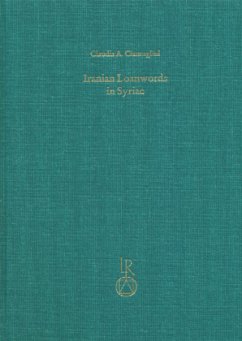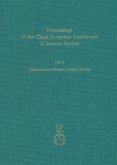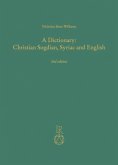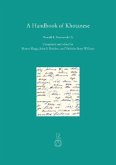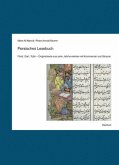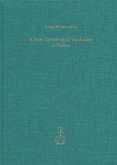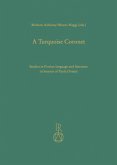The book investigates the deep linguistic contact between Iranians and Arameans from the formation of the Achaemenid empire onwards, and focuses especially on the linguistic relationship between Middle Persian and Classical Syriac during the Sasanian empire, a subject on which a modern systematic study was still missing.
The first part of the book is a detailed study of the historical and linguistic conditions which favoured the entry of a great number of Iranian words into Syriac and the linguistic consequences of such borrowings. Besides a short description of the Syriac language and literature and a historical overview of the relationship of Syriac with Greek and Iranian languages, the first part of the book analyses in details the typology of the various kinds of Iranian borrowings in Syriac, both lexical and morphosyntactic ones. The loanwords are examined according to their different epochs of attestation, dialectal sources and level of phonological and morphological adaptation. Starting from a contrastive analysis of the phonological systems of Classical Syriac and Middle Persian, the first part of the book also deals with the peculiarities of the phonological and morphological treatment of Iranian loanwords in Syriac, especially in relation to phoneme inventories, syllabic structures, prothetic vowels and consonant clusters. Finally, all the data are included in a general picture of the specific features of the interference between Syriac and Iranian languages, and this interference is compared with the most widespread theoretical issues in contact linguistics, from Weinreich's study until Thomason and Kaufman's one.
The second part contains, in dictionary form, hundreds of entries in which each single Iranian loanword is considered, together with its etymon, alternative forms, and derivatives. Particular attention has been paid to reborrowing phenomena, calques and allotropes. Each entry also includes a list of occurrences and the relevant bibliography. Scholars interested in Middle Iranian lexicography will find many Middle Persian words not otherwise known and only recoverable through their presence in Syriac as loanwords, especially words pertaining to the semantic areas of medicine, botany, mineralogy, administration and so on. A complete index of words closes the volume.
The study of the prolonged contact between such prestigious languages as Syriac and Middle Persian, that are only attested in written records, enriches our knowledge of the typologies of language interference and bilingualism in ancient society. The book may be of interest both for general and historical linguists concerned with bilingualism, diglossia and contact phenomena, and for specialists in Iranian and Semitic linguistics.
Hinweis: Dieser Artikel kann nur an eine deutsche Lieferadresse ausgeliefert werden.
The first part of the book is a detailed study of the historical and linguistic conditions which favoured the entry of a great number of Iranian words into Syriac and the linguistic consequences of such borrowings. Besides a short description of the Syriac language and literature and a historical overview of the relationship of Syriac with Greek and Iranian languages, the first part of the book analyses in details the typology of the various kinds of Iranian borrowings in Syriac, both lexical and morphosyntactic ones. The loanwords are examined according to their different epochs of attestation, dialectal sources and level of phonological and morphological adaptation. Starting from a contrastive analysis of the phonological systems of Classical Syriac and Middle Persian, the first part of the book also deals with the peculiarities of the phonological and morphological treatment of Iranian loanwords in Syriac, especially in relation to phoneme inventories, syllabic structures, prothetic vowels and consonant clusters. Finally, all the data are included in a general picture of the specific features of the interference between Syriac and Iranian languages, and this interference is compared with the most widespread theoretical issues in contact linguistics, from Weinreich's study until Thomason and Kaufman's one.
The second part contains, in dictionary form, hundreds of entries in which each single Iranian loanword is considered, together with its etymon, alternative forms, and derivatives. Particular attention has been paid to reborrowing phenomena, calques and allotropes. Each entry also includes a list of occurrences and the relevant bibliography. Scholars interested in Middle Iranian lexicography will find many Middle Persian words not otherwise known and only recoverable through their presence in Syriac as loanwords, especially words pertaining to the semantic areas of medicine, botany, mineralogy, administration and so on. A complete index of words closes the volume.
The study of the prolonged contact between such prestigious languages as Syriac and Middle Persian, that are only attested in written records, enriches our knowledge of the typologies of language interference and bilingualism in ancient society. The book may be of interest both for general and historical linguists concerned with bilingualism, diglossia and contact phenomena, and for specialists in Iranian and Semitic linguistics.
Hinweis: Dieser Artikel kann nur an eine deutsche Lieferadresse ausgeliefert werden.
"This is certainly one of the most remarkable works in Iranian philology, particularly in Irano-Semitic linguistic interrelations, published in the recent times. It will definitely rank among the important reference book in Iranian Studies in decades ahead."
Garnik Asatrian
In: Iran and the Caucasus. 15 (2011). pp. 322-325.
Garnik Asatrian
In: Iran and the Caucasus. 15 (2011). pp. 322-325.

